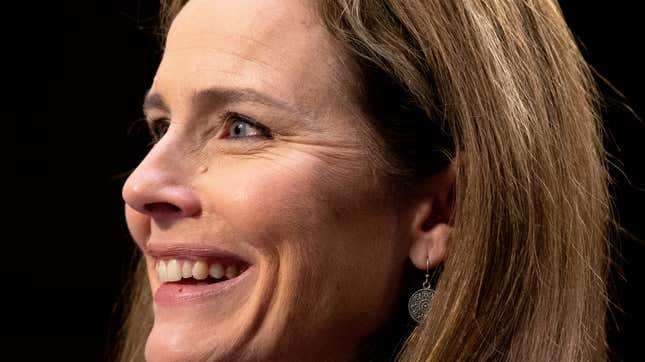Wildly Anti-Abortion Judge Can't Possibly Say Whether She'd Restrict Birth Control
Politics

Supreme Court nominee Amy Coney Barrett, who has made her distaste for Roe v. Wade obvious in statements she’s made in the past and in anti-abortion ads that she has signed her name to, refused on Tuesday to answer basic questions about her legal views, including on abortion access. But as the Nation’s Elie Mystal wrote of her evasions, her non-answers in fact were telling. “Barrett came as close to saying she would overturn Roe as one can get without literally spelling it out,” he wrote. “She was given numerous opportunities to defend the basic concept of a women’s right to choose, as Ruth Bader Ginsburg did at her confirmation hearings. She declined. She was given numerous opportunities to say that a woman’s right to choose was protected in the Constitution. She refused.” Instead, Mystal wrote, “she tried to make Roe sound like it wasn’t an important precedent”—a sign of how she, in all likelihood, would justify her reasoning to gut it.
On Wednesday, Barrett engaged in similar evasions, this time when it came to birth control access, refusing to answer whether a key decision that granted married couples the right to use contraceptives, Griswold v. Connecticut, was decided correctly. As Jezebel’s Molly Osberg wrote recently, the anti-abortion movement, led by Catholic activists, has long included ending access to birth control as part of their broader attack on reproductive rights. In this context—seen as well in Ted Cruz’s offhand remarks on Tuesday describing birth control as “abortion-inducing drugs”—Barrett’s coyness is a sign of nothing more than a refusal to answer questions that we already know the answers to.
During the hearing, Democratic Senator Chris Coons brought up Griswold, noting that Justice Antonin Scalia believed that it had been decided incorrectly. Coons shared that when he and Barrett had spoken over the phone, Barrett had told him that she “couldn’t think of any specific issue of law” that she disagreed with her mentor on. “Do you agree with him that Griswold was wrongly decided and thus they should be able to make it illegal to use contraceptives, if they so chose?” Coons asked Barrett.
-

-

-

-

-

-

-

-

-

-

-

-

-

-

-

-

-

-

-

-

-

-

-

-

-

-

-

-

-

-

-

-

-

-

-

-

-

-

-

-








































